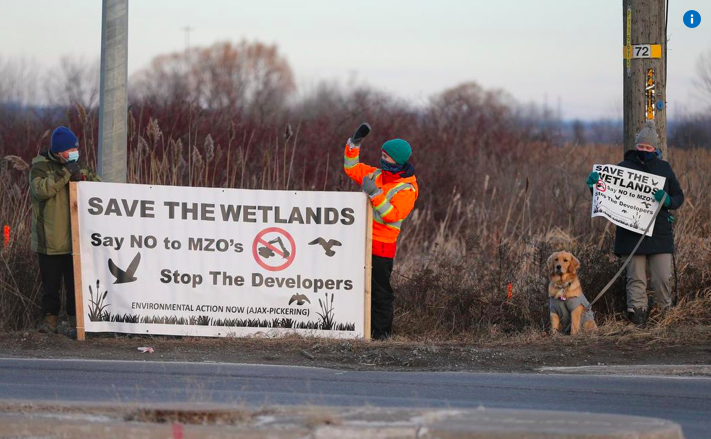Blockades at Pickering wetlands development greet first use of new conservation authority law

Citizens show up to defend Lower Duffins Creek wetland after TRCA forced to issue permit for MZO-approved development. -Toronto Star photo
By Noor Javed Toronto Star
Crystal Fielding has never really been political.
So when the mother of two heard about protests being organized this week by local residents to block heavy trucks and machinery from entering a provincially significant wetland in Pickering slated for development — she knew she wanted to take part, but wasn’t sure if she could do it.
“I have never participated in anything like this before. I was a little terrified,” said Fielding, who lives in nearby Oshawa.
“But I woke up that morning and was telling my kids about the protest, and in three seconds, they were ready to go help ‘save the trees.’”
Fielding joined dozens of others with the group Environmental Action Now (Ajax-Pickering) who have held blockades at the site at Squires Beach Road and Bayly Street just south of Highway 401 this week to protest the disturbance of the land considered environmentally sensitive.
Last week, the Toronto and Region Conservation Authority (TRCA) issued a permit to the developer, Pickering Developments Squires Inc., to conduct borehole testing — which determines groundwater and soil characteristics — on the site that will eventually be paved to build a warehouse distribution centre and a film studio.
In November, Minister of Municipal Affairs and Housing Steve Clark issued a minister’s zoning order (MZO) — a tool that gives the minister the authority to designate land use without the possibility of appeals — to fast-track the Pickering project. Normally, provincial policy forbids development on provincially significant wetlands.
In its staff report, the TRCA said it was obligated to issue the permit for the ground work on the Lower Duffins Creek site given the legislative changes pushed through by the province last year. Those changes placed limits on the ability of conservation authorities to assess the environmental impact of developments, and in particular, those approved through an MZO.
“A conservation authority is required to issue permission for a development project that has been authorized by a Minister’s Zoning Order (MZO), outside of the Greenbelt,” said the report, written by Steve Heuchert, associate director, development planning and permits with the TRCA.
Michael Tolensky, the chief financial and operating officer for the TRCA, said the Pickering project is likely the first test for the new legislation around MZOs.
“As for a borehole permit, we wouldn’t normally support it,” said Tolensky. But because the TRCA is “forced to issue a permit,” he said the authority put in six conditions to help mitigate potential damage to the land.
Even then, the TRCA issued the permit, as the staff report reiterates, reluctantly.
“The board of directors does not support development within wetlands, particularly, provincially significant wetlands, and on this basis does not support development of this site as per the Minister’s Zoning Order (MZO) approved by the province,” the report states.
According to the TRCA, the 22-hectare site, which looks like a large open field, includes significant wetlands, woodlots and wildlife habitat.
That’s why dozens of residents have shown up for the blockades this week, according to resident Trish Spindel. The blockade on Thursday held up the work for over two hours, until police were called, she added.
“We are just very concerned that they are just paving over these lands with no public input, and they have disempowered the TRCA in the process,” said Spindel. “This is a way for us to take matters into our own hands.”
The mayor of Pickering, Dave Ryan, said council made a “difficult decision” to request an MZO with “the assurance that the wetlands would be properly compensated.”
According to the report, the TRCA set out strict and “binding” conditions that have to be followed by the developer while the work is conducted. These include the need for the presence of an ecologist, that the work is done during frozen conditions, and that it’s only done on certain areas of the property.
In a letter to the TRCA, the environmental advocacy group Environmental Defence said it felt the conditions were not sufficient “to prevent prejudicial damage to the wetlands,” and urged the TRCA to refuse the request.









these wetland cannot be compensated. Schemes doing this in the United States have not worked for wetland compensation, some that were paid for were actually never built.